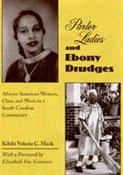Parlor Ladies and Ebony Drudges
African American Women, Class, and Work in a South Carolina Community

- Author(s): Mack, Kibibi Voloria C.
- Series:
- Imprint: Univ Tennessee Press
- Publication Date: 2011-09-10
- Status: Active
- Available in Paper: Price $24.95 | Buy Now
- Leaf eReader required for PDF ebooks
“Parlor Ladies and Ebony Drudges does not simply fill in another piece of the mosaic that women’s historians have been assembling. Raising new questions, it offers a fresh perspective on the history of African American women and invites us to follow new paths of inquiry.”—from the Foreword by Elizabeth Fox-Genovese
Focusing on the community of Orangeburg, South Carolina, from 1880 to 1940, Parlor Ladies and Ebony Drudges explores the often sharp class divisions that developed among African African women in that small, semi rural area. Kibibi Voloria Mack’s research challenges the conventional thesis that all African American women toiled—and toiled hard—throughout their lives. She shows that this was only true if they belonged to certain socioeconomic classes. Mack finds that, in Orangeburg, a significant minority did not have to work outside the home (unless they chose to do so) and that some even had staffs of domestics to do their housework—a situation paralleling that of the town’s genteel white women. While the factors of gender and race did restrict the lives of all African American women in Jim Crow Orangeburg, Mack argues, there was no real solidarity across class lines. In fact, as she points out, tensions often arose between women of the upper classes and those of the middle and working classes.
Mack offers a rich picture of the work patterns, social lives, home lives, attitudes, and self-images of the women of each class, carefully distinguishing their differences and noting the historical changes and continuities that affected them. The book is not only an important contribution to the study of African American women in the South but also to the research on women’s work more generally: it is a vital corrective to the past emphasis on white women living in northeastern urban areas.
The Author: Kibibi Voloria C. Mack is an assistant professor in the Africana Studies Department at the University of Maryland, Baltimore County. She is a native of Orangeburg, South Carolina, and received her doctorate in history at the State University of New York, Binghamton. The mother of four daughters, she has also written several books for young people on African and African American history.
